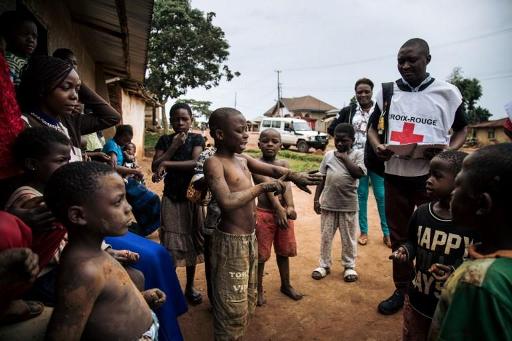The European Commission on Monday announced the adoption of its humanitarian aid budget for 2020, amounting to €900 million.
The aid, which is provided each year, is channelled through partner humanitarian organisations such as UN agencies, the Red Cross and NGOs. Its targeted beneficiaries are people affected by armed conflict, famine and the direct or expected impact of climate change.
The EU is the leading global humanitarian aid donor and helps people in over 80 countries.
"EU humanitarian aid allows us to save millions of lives worldwide, putting EU global solidarity into action. Yet humanitarian crises are increasing in complexity and severity. Even though conflict remains the main cause of hunger and displacement, its impact has become seriously worsened by climate change,” said Janez Lenarcic, Commissioner for Crisis Management on Monday (20 January).
This year’s package includes €400 million for programmes in Africa, aimed at assisting people suffering from the food and nutrition crisis in the Sahel, those displaced by violence in South Sudan, and vulnerable populations in the Democratic Republic of Congo (DRC).
In the DRC, European humanitarian aid contributed last year to the fight against Ebola. The ongoing Ebola epidemic, declared in August 2018 in the east of the country, has already claimed over 2,200 lives.
In Asia and Latin America, EU aid worth €111 million will continue to assist the most vulnerable populations affected by the crisis in Venezuela and refugees in neighbouring countries. The European Union will also continue to provide help in Asian countries such as Afghanistan, which has witnessed war for nearly four decades, and Myanmar and Bangladesh, which both host Rohingya populations.
For the Middle East, the Commission has announced an envelope of €345 million for victims of the crisis in Syria, refugees in neighbouring countries, and people affected by the extremely critical situation in Yemen. The Commission’s initial humanitarian budget for 2019 had already been earmarked to a large extent for Syria and Yemen and reached a record level of €1.6 billion.
A major challenge for EU is to provide aid to countries in armed conflict or crisis, where the regimes are diverting the aid for political reasons or preventing the aid from reaching the populations in need. A recent example is Syria, where the UN could only agree on delivering humanitarian aid to the north part of the country via two border crossings with Turkey.
A Commission spokesperson told The Brussels Times that total EU humanitarian assistance for the Syria crisis amounts to over €3 billion since 2011, including health care, food, water and shelter, but did not specify to what extent the money has been spent on the ground.
The UN resolution excluded the Yarobuia crossing with Iraq. There are reportedly 1.4 million people in need in north-east Syria, which is ruled by a Kurdish-led Autonomous Administration, but only 850 000 are reached by the aid according to UN.
The Commission spokesperson said that in 2019 the EU made available close to €40 million to its humanitarian partners in north-east Syria. At present, at least a similar amount is being allocated by the EU to respond to the persisting humanitarian needs.
“The non-renewal of the UN resolution for the Yaroubia crossing is of particular concern for the provision humanitarian aid in north-east Syria, in particular the health sector. The EU is supporting partners, international NGOs in particular, to analyse and search for solutions to this new challenge.”
“As with all EU humanitarian aid, it is never provided to through authorities but through its partner organisations, consisting of the United Nations and its agencies, the International Red Cross/Red Crescent family and international NGOs,” the spokesperson said.
However, only organisations approved by the Assad regime are allowed to operate in Syria. The situation is not much better in Venezuela, where the Maduro regime is denying the humanitarian crisis and has been blocking international aid.
The Brussels Times

